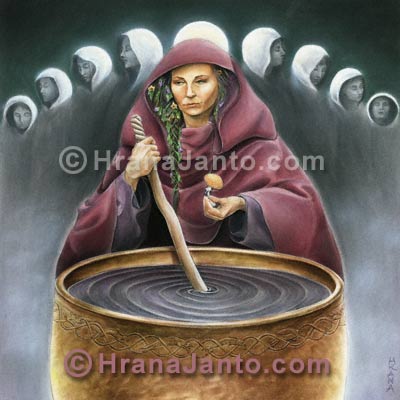 |
|
|||||
PREVIOUS | NEXT | A,B,C, D,E, F,G,H,I, J,K,L,M, N,O,P,Q, R,S, T,U,V,W,X,Y,Z | Help | ALL | INDEX
I painted Cerridwen in 1993 for Llewellyn's1994 Myth & Magic Calendar.
She is included in the Goddess Oracle. She also appreared in the 2002 We'moon
wall calendar & datebook. This image is available on a blank-inside
greeting card as well.
| Cerridwen from Goddesses and Heroines |
Exerpt from Goddess & Heroines by Patricia
Monaghan [Used by permission. This text is NOT included in the Goddess Oracle] |
Cerridwen was worshipped by the people of Wales -- who call themselves the Cymri or friends, for the term "Welsh" means "foreigner" in the language of their British neighbors.
Cerridwen lived on an island in the middle of Lake Tegid with her two children -- the beautiful Creidwy and the ugliest boy in the world, Afagdu. To compensate her son for bestowing such a body on him, the goddess brewed a magical formula that would make her son the most brilliant and inspired of men. For a year and a day, she kept herbs simmering in her caldron, which she left under the care of a little boy named Gwion.
One day, while the goddess was out collecting more herbs for her brew, a few drops of the bubbling liquid splattered onto Gwion's finger. Scowling in pain, he stuck his hand instantly into his mouth. Miraculously, he was able to hear everything in the world and to understand the secrets of both the past and the future.
His enchanted foresight showed him how angry Cerridwen would be when she found a mere mortal had acquired the inspiration intended for her son. So he ran away; the all-knowing Cerridwen realized what had happened and pursued him. Gwion changed himself into a hare; Cerridwen pursued him as a greyhound. So they ran: he as a fish, she as an otter; he as a bird, she as a hawk; he as a grain of wheat, she as a hen.
It was in the final form that she caught and devoured him, bearing him nine months later as a child. She threw the baby into the water where he was caught by a prince and grew into the poet Taliesin, the greatest poet in his language. Thus the Welsh expressed their understanding that death and rebirth were necessary for true inspiration to be brought into this world, showing the Muse, the goddess of inspiration, in a somewhat more terrible form than she appears in other cultures.
| Back to TOP | Published by Llewellyn, copyright 1997. Used by permission of the author. |
![]()